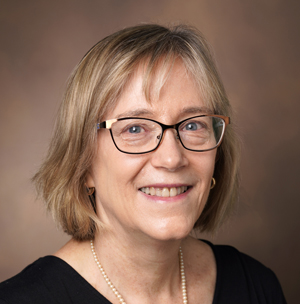
Monroe Carell Jr. Children’s Hospital at Vanderbilt performed its first pediatric heart transplant in 1987. The program officially started in 1989.
It was one of the first programs of its kind in the country, and it is now among the largest. Debra Dodd, MD, professor of Clinical Pediatrics and medical director of the Pediatric Heart Transplant Program, was at the heart of it.
After nearly 40 years and being involved in more than 300 lifesaving transplantations at Monroe Carell, Dodd is retiring.
Her connection to Nashville began during a combination vacation visit and residency program search.
“There was something about the Southern hospitality,” she said laughing. “It wasn’t just in the city; it was what I felt at the hospital too. The congeniality is a big part of what attracted me.”
But it was her love for children, giving them a chance at life and the ever-evolving platform of cardiology interventions that kept her at Monroe Carell.
“Every single patient is different and needs a specific management,” Dodd said. “I love that each patient is their own puzzle. How best can we get that patient to where they can lead as normal a life as possible.
“There are so many solutions, and we have to figure out what works best for each child to significantly improve their lives. It’s amazing to see more and more interventions for more complex conditions.
“I have been a part of a very exciting field that is challenging as well as fun. One of the best parts is getting the positive feedback and seeing the outcomes of helping children and their families.”
Dodd graduated from Johns Hopkins University in 1980 and remained at the school, earning her medical degree in 1984. She completed her residency and fellowship at Vanderbilt, joining the faculty in 1990.
In her early years, she gravitated towards transplantation and eventually was named the medical director of the pediatric transplant program in 1993.
According to a longtime colleague, her vision for transplant in the smallest of patients propelled the program into a new arena.
“At the beginning, people didn’t think transplants would be a good option for infants,” said James Johns, MD, professor of Pediatrics. “She took that leadership and approach and ran with it. She has always focused on how best to manage transplants for infants and children. They are so very different from adults.”
Johns has worked with Dodd since her arrival as a resident. He said she joined a faculty of five. Today there are more than 30 team members.
“The program as a whole has grown, and she was a big part of that. She will leave a huge hole in our transplant program — what was so remarkable is how involved she has been with the patients and families, down to the siblings.
“She has been available for them and for us as colleagues, serving as a source of good judgement, not just for transplant patients, but cardiology overall. She also leaves a legacy of training additional transplant doctors.”
During her nearly 40-year span at Monroe Carell, Dodd brought a consistency and longevity of leadership and support, said Johns.
Along the way, Dodd said she witnessed the progress of her subspecialty that included the use of echocardiogram to detect heart conditions and the ability to do genetic testing for both diagnosis and therapeutic treatments. She is excited about what is on the horizon for pediatric cardiology and transplantation and looks forward to hearing about it all.
But she realizes it’s time to step back and focus on what is ahead for her.
“I haven’t fully decided what I will do next,” she said. “I’ve read a lot about surviving retirement.
“I am leaving at the right time for me. I still have lots of things I want to do outside of the hospital while I am healthy and active. I do know that I will continue to garden and be outdoors — that’s my form of meditation.
“I will miss so much of my hospital life and my patients, but I will always be connected.”












